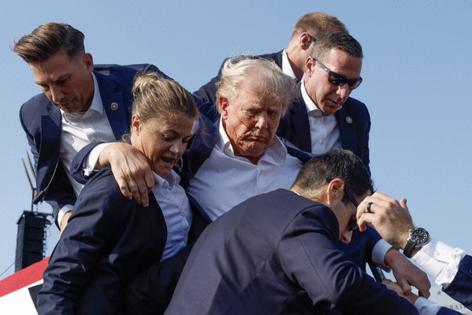Debra-Lynn B. Hook: Painful memories amid Trump shooting
Published in Mom's Advice
Widely distributed images of the recent attempt on Donald Trump’s life couldn’t help but evoke memories of a similar event for those of us who were alive on Nov. 22, 1963.
On both occasions, we watched as an ordinary political event erupted into chaos.
We saw the duck and cover, the whisking away, the blood.
Both moments constituted dreadful events in our nation’s history, with notable differences, including, of course, the outcome.
The year 1963 and the assassination of President John F. Kennedy also represented a different time.
A time of national prosperity and public harmony, the early 1960s ultimately gave way to massive unrest in the later 1960s — to the civil rights movement and Vietnam War protests, to the deaths of Robert Kennedy, Malcolm X and Martin Luther King, to a growing mistrust around the formerly safe institutions of family, church and government.
But for the moment we were living in a period that historians label the “last age of innocence.”
Certainly, it was a time of absolute innocence for me.
I was 7 1/2 when President Kennedy was shot. I was attending the small, eight-room Holy Rosary Catholic School in Greenville, South Carolina, when the principal’s voice came across the loudspeaker sometime after lunch, telling us we would be gathering in the church adjacent to the school.
Students, sisters and priests, we processed to the church where we knelt in prayer, but not for long. Soon after we assembled, we learned the president had not only been shot. He had died. Our parents were coming to pick us up.
At home, my mother seemed to be in a trance. With an approval rating of 70%, JFK had been promising and popular. He was well-spoken and smart. He was also Catholic. My mother, a half-Lebanese Catholic living in the staunchly Protestant South, found in JFK something to hold onto.
Like many Americans, my mother would not leave the TV for days. She sat for hours while the president’s body lay in state and then later, as the funeral procession carrying Kennedy’s body by horse-drawn wagon brought lasting images of a country united around shared grief.
Our living room became an inner sanctum, the curtains drawn, not out of respect, but because you couldn’t see the picture on our old TV unless the room was dark. Mama not only closed the curtains but she sat right up on the TV with black fabric covering her head and the TV to make the picture even darker.
Although I was too young to fully comprehend, it was a defining moment in my life. All around me, there was no thought given to anything but grief. My mother was grieving. Neighbors, extended family, the man at the grocery store, everybody was grieving. Everybody, it seemed, was joined together in a common emotional expression around a common moment.
That was 60 years ago. Here we are now at a different juncture. And it doesn’t seem clear if our nation will ever rally again around a common moment.
In fact, the opposite is true. If one group is rallying, the other decidedly is not.
My youngest child, at 27, said to me recently that he worries about people younger than he, whose only vision of American politics is bitter and fractious.
“At least I had a glimpse of more respectful rhetoric before this era we are in,” he said.
My son knows to some degree a time of greater civility, community and unity, as many of us do. This makes us unlucky in some ways. Having known a more genteel time, we mourn its absence.
Those of us who remember better times are also at an advantage. Because we know how it feels to live among a populous that is connected, or at least civil, we have a sense of what it is we need to do, at least as individuals.
This is no insignificant thing. Harvard political scientist Robert Putnam, who 30 years ago wrote “Bowling Alone: The Collapse and Revival of American Community,” says that by restructuring our individual lives to include greater community and connection, we can actually rekindle democracy.
“Doing democracy…of course it means voting or it means organizing,” Putnam recently told the New York Times. "(But) I don’t think the way to save democracy is just to set out to save democracy.”
We can work for the greater good of the wider nation in traditional ways, in other words, by voting and organizing, Putnam said. But we can also improve the world by engaging with each other, whether in formal groups or by dropping by our neighbor’s with a pan of brownies.
By engaging with each other, we will get to know each other. By getting to know each other, we will come to care about each other. By coming to care about each other, we will want to understand each other.
And maybe one day we will mean it when we say “We’re all in this together.”
I consider the words of pundits like Putnam, who at 83 has spent a lifetime studying and caring for American culture.
And I am reminded of an inaugural presidential address not so many decades ago.
"And so, my fellow Americans, ask not what your country can do for you, ask what you can do for your country,” Kennedy famously said.
“With a good conscience our only sure reward, with history the final judge of our deeds, let us go forth to lead the land we love.”
©2024 Tribune Content Agency, LLC










Comments